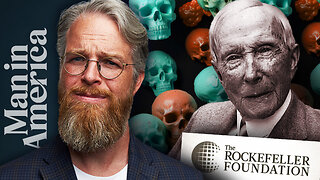Premium Only Content

The Traitor
Appearance and Demeanor:
The Traitor often appears outwardly loyal and trustworthy, blending seamlessly into their surroundings. They may exude charm, charisma, or an air of reliability that initially masks their true intentions. Physically, they can be of any appearance—there is no specific look that defines a traitor—but their expressions and body language might subtly hint at hidden agendas.
Motivations:
Motivations for betrayal vary widely and can include personal gain, survival, revenge, ideological differences, or coercion. The Traitor might have experienced a perceived injustice, felt overlooked or mistreated, or succumbed to greed or ambition. Understanding their motivations adds depth to their character and underscores their internal conflict.
Behavior and Actions:
Initially, The Traitor may actively participate in and support the group or cause they eventually betray. They might excel in their role, earning trust and admiration from others. However, behind the scenes, they subtly sow discord, gather information, or plot their betrayal.
Turning Point:
The moment of betrayal is pivotal. It could be a calculated act or a spur-of-the-moment decision driven by circumstances. The Traitor may choose to defect to an opposing faction, reveal secrets, sabotage plans, or undermine allies—all of which profoundly impacts the story's direction and the lives of those affected.
Internal Conflict:
The Traitor often grapples with internal turmoil, torn between their former loyalties and newfound choices. Guilt, remorse, or a sense of duty might conflict with their ambition or desire for change. This conflict adds depth to their character, making them more relatable or sympathetic despite their actions.
Consequences:
Betrayal carries consequences. The Traitor risks losing friendships, respect, or even their life depending on the severity of their actions. They may face retaliation, isolation, or inner turmoil as they come to terms with the fallout of their betrayal.
Narrative Role:
In storytelling, The Traitor serves various purposes. They can introduce plot twists, drive conflict, and challenge protagonists' beliefs or alliances. Their betrayal often forces characters to reassess trust and loyalty, leading to character growth and thematic exploration
-
 3:17:28
3:17:28
TimcastIRL
6 hours agoTrans Shooter Targets Catholic Kids In Mass Shooting, Leftists Reject Prayers | Timcast IRL
220K61 -
 1:31:29
1:31:29
Brandon Gentile
1 day ago25 Year Wall Street INSIDER: $1M Bitcoin Soon Is Just The START
18.2K -

SpartakusLIVE
7 hours ago#1 Birthday Boy Celebrates with MASSIVE and HUGE 4.8-Hour Stream
50.9K -
 55:54
55:54
Man in America
9 hours agoFrom Oil Barons to Pill Pushers: The Rockefeller War on Health w/ Jeff Adam
47K6 -
 3:02:18
3:02:18
Barry Cunningham
6 hours agoBREAKING NEWS: PRESIDENT TRUMP THIS INSANITY MUST END NOW!
92.8K176 -
 3:58:27
3:58:27
StevieTLIVE
5 hours agoWednesday Warzone Solo HYPE #1 Mullet on Rumble
37.8K -
 5:58
5:58
Mrgunsngear
7 hours ago $3.67 earnedBreaking: The New Republican Party Chairman Is Anti 2nd Amendment
29.3K9 -
 2:28:35
2:28:35
Geeks + Gamers
6 hours agoGeeks+Gamers Play- MARIO KART WORLD
28.7K -
![(8/27/2025) | SG Sits Down Again w/ Sam Anthony of [Your]News: Progress Reports on Securing "We The People" Citizen Journalism](https://1a-1791.com/video/fww1/d1/s8/6/G/L/3/c/GL3cz.0kob.1.jpg) 29:34
29:34
QNewsPatriot
6 hours ago(8/27/2025) | SG Sits Down Again w/ Sam Anthony of [Your]News: Progress Reports on Securing "We The People" Citizen Journalism
21.8K6 -
 25:12
25:12
Jasmin Laine
11 hours agoDanielle Smith’s EPIC Mic Drop Fact Check Leaves Crowd FROZEN—Poilievre FINISHES the Job
24.5K23